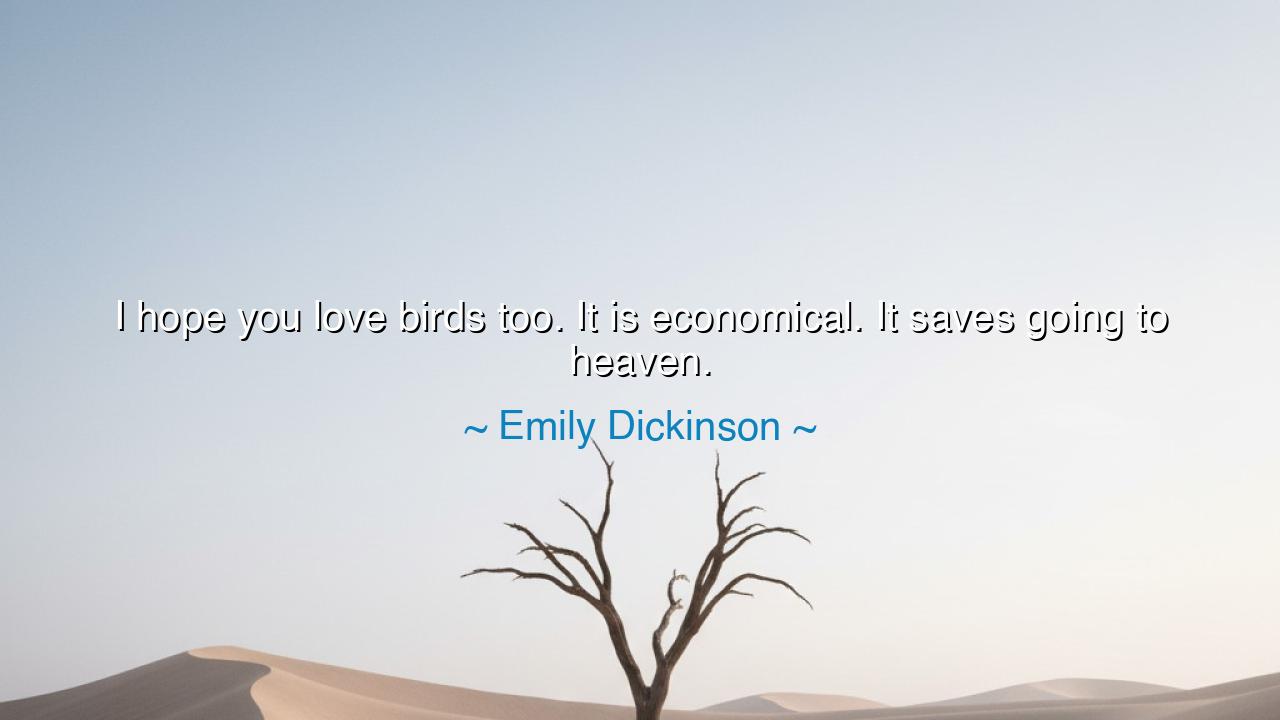
I hope you love birds too. It is economical. It saves going to






In the luminous and enigmatic words of Emily Dickinson, the poet who dwelt between silence and eternity, there shimmers a truth both delicate and divine: “I hope you love birds too. It is economical. It saves going to heaven.” At first glance, the saying seems playful, even whimsical — but beneath its simplicity lies a profound philosophy. Dickinson, who spent most of her life in seclusion, found in the smallest things the presence of the infinite. To her, the song of a bird, the flutter of its wings, or its dance upon the morning air was no less than a glimpse of paradise itself. To love birds, she tells us, is to see heaven while still on earth.
The origin of this quote lies in a letter Dickinson wrote to her friend and confidant, who often received from her these bright fragments of spiritual wisdom. The poet’s reclusive nature made her an observer of the intimate — of bees, blossoms, dawns, and birds — and through these, she touched eternity without leaving her home in Amherst. Her humor here is subtle but radiant: she speaks of loving birds as being “economical,” as if affection for creation were a thrifty path to joy, saving one the trouble of waiting for heaven’s reward. Yet behind her wit, there is deep theology — the belief that the divine is not far away, but woven into the fabric of the living world.
To love the bird is to love freedom, beauty, and song. Birds embody the soul’s longing to rise, to transcend the heaviness of flesh and fate. Their flight is the very symbol of liberation, their song the echo of creation’s first joy. Dickinson’s heart, bound in solitude, found kinship in them — for they lived in both worlds: the earth and the sky. Watching them, she discovered what many seekers and mystics have found before her: that heaven is not a distant kingdom, but a state of perception. Those who can see the sacred in the ordinary need not die to taste eternity; they carry heaven within them.
Throughout history, the wise have spoken this same truth in many tongues. Saint Francis of Assisi, who called the birds his brothers, saw in them the innocence of the divine. He would speak to them as equals, saying that they, too, praised God through their flight and their song. In that same spirit, Dickinson’s love for birds was not sentimental, but sacred. Her “economy” was not of money, but of spirit — the wisdom of finding joy in what is freely given. She needed no cathedral, no doctrine, no promise of an afterlife, for she found her divinity in the morning light, her worship in the simple act of seeing beauty.
There is also a deeper whisper in her words — that heaven is a perception, not a destination. Many live their lives yearning for a distant paradise, while the world itself burns with holiness at their feet. To love birds — or trees, or stars, or rain — is to awaken to this truth: that creation is already a temple, and every creature a hymn. Dickinson invites us to see with the eyes of gratitude, to find eternity in the brief song of the world. The one who does this has no need to wait for salvation, for he has already tasted it in every dawn.
In this way, Dickinson’s quote is not only poetic but profoundly spiritual and practical. It teaches that joy is found not in grand achievements or distant promises, but in awareness — in learning to love the world deeply, humbly, as it is. A person who can delight in a bird’s flight, or in the rustle of leaves, or in the light upon water, becomes rich without wealth and blessed without heaven’s gates. To such a soul, every moment is a sacrament, every breath a prayer.
So, my children of thought, take this wisdom as your own: love the small, the simple, the living. Look up at the sky and greet the winged messengers of joy. Do not rush through life as if paradise were elsewhere. Let beauty heal your spirit, and gratitude expand your heart. For when you learn, as Emily Dickinson did, to find heaven in the flutter of a bird’s wings, you will discover that heaven was never a place to reach — it was always here, hidden in the song of the world.






AAdministratorAdministrator
Welcome, honored guests. Please leave a comment, we will respond soon